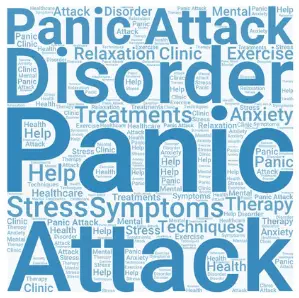If you’re looking for anxiety attack help, you are at the right place. The symptoms of panic attacks are like those of many other conditions. To rule out a medical condition, your doctor will likely start by performing a thorough physical exam. They may also refer you to a mental health professional to help diagnose your condition. If the attacks have become recurring and bothersome, you may have a condition known as panic disorder.

Dealing with panic attacks
One of the most effective techniques for dealing with panic attacks is to calm your mind by focusing on different muscle groups:
Focus on your face and neck, as these areas hold tension. After a few seconds, relax your jaw, neck, and forehead.
Keep going till you reach the soles of your feet. Relax each part of your body.
Try to divert your attention away from the attack by thinking of something pleasant.
Once your mind is centered, you can focus on something that makes you happy.
People of all ages who have panic attacks may be afraid of their thoughts. They may even think they are going crazy or dying. To overcome these fears, they must learn to be more aware of their thoughts. The best way to do this is to practice mindfulness, which helps you become more aware of yourself. By doing this, you will learn to deal with panic attacks and lessen the likelihood of them happening again. Also, learn to talk to others about your panic attacks more.
How to handle an anxiety attack
Anxiety attacks are frightening. They often last five to thirty minutes, leaving the attack sufferer feeling debilitated and helpless. But you don’t need to go crazy or be unconscious to handle an attack. You might feel like you’re about to die or even have a heart attack. It is not embarrassing to be afraid. Here are some ways to help you cope with an anxiety attack.
Practice deep breathing to get control of your panic attacks. Deep breathing can increase the oxygen supply to the brain. It stimulates the parasympathetic nervous system, which promotes a sense of calm and ease. You may also want to distract your mind with pleasant thoughts. Try thinking of the positive things in your life. You may be able to identify your trigger and learn to deal with it. If this doesn’t work, you may need to consult a professional.
How to help anxiety attack
While going through an anxiety attack, one of the best things you can do is focus on your surroundings and continue what you are doing. Deep breathing is helpful during a panic attack as it increases oxygen to your brain and activates the parasympathetic nervous system. This nervous system promotes feelings of calmness and ease. Also, you can try to make yourself feel more comfortable by using your senses. You can sniff a pleasant odor/scent or splash cold water on your face.
Counting backward from 100 is a great way to distract your mind and calm your body. Counting to ten can also help calm your nerves. This method allows people who struggle with anxiety to focus on something else. It also helps to change your environment from stressful to calm. Practicing these techniques will help you overcome your attacks.
How to help someone with a panic attack
If you see someone having a panic attack, there are some things you can do to help:
Try to stay calm. This will help the person feel less anxious.
Ask if there is anything you can do to help.
Encourage the person to breathe deeply. This will help to oxygenate the blood and slow down the heart rate.
Offer reassurance and support.
Let the person know that you are there for them and that they will get through this.
Panic attacks can be frightening, but there are ways to deal with them. If you or someone you know is having a panic attack, try deep breathing, counting to ten, or changing your environment. These techniques can help to calm the body and mind. With practice, you will be able to overcome your fear and anxiety.
How to prevent panic attacks
When you suffer from a panic attack, you might feel like your world is crashing down around you. This is the exact moment to act. Take control of your breathing. Focusing on a single object will allow you to slow your heart rate and reduce sweating and dizziness. Slow breathing is also known as deep breathing. This helps you restore your body’s equilibrium and reduce the symptoms of panic attacks. To prevent these attacks, you can practice deep breathing whenever you feel the symptoms of one.
Managing your stress can also help you prevent panic attacks. Learning relaxation techniques, exercising, and acknowledging your feelings in healthy ways can help you reduce your anxiety and panic attacks. Try focusing on things you’re grateful for instead of worrying about them. Try distraction when you feel the attacks coming on. Imagine the last time you did something good that made you happy or successful. This way, you’ll be less likely to feel so overwhelmed by negative thoughts.
How to stop panic attacks forever.
If you have panic attacks, it’s essential to seek help from a professional. They can work with you to identify your anxiety triggers and underlying causes. Once you know what’s causing your panic attacks, you can begin to work on a plan to address them. This might include cognitive-behavioral therapy, medication, or a combination. With treatment, you can learn how to control your anxiety and finally stop having panic attacks altogether.
Managing panic attacks.
If you suffer from severe panic attacks, you may be looking for information on managing panic attacks. But there is no single remedy that will work for everyone. It would help if you tried several strategies to find the ones that work best for you. Combining home remedies and medical treatment is a good route to follow.
Therapy is a good option for managing panic attacks, but if you cannot find a therapist, you may enjoy consulting a mental health professional. During counseling, you can discover what triggers your attacks. By understanding what triggers your attacks, you can reduce their power. You can also learn how to manage stress and improve your mood through activities like progressive muscle relaxation.
Moreover, exercise can improve your mood and help you get a better night’s sleep. Practicing these techniques will make your panic attacks easier to cope with and less frightening.
In short, there is no one-size-fits-all solution to managing panic attacks. You may need to try several strategies before you find the ones that work best for you. But with time and effort, you can learn how to control your anxiety and eventually stop having panic attacks altogether.
Panic attack, chest pain
Panic attacks and chest pain can be frightening experiences, as they are often mistaken for heart attacks, but there are ways to cope with them. Stay calm, and encourage the person to breathe in a slow and deep manner. Offer reassurance and support. With practice, you will be able to overcome your fear and anxiety. Managing your stress can also help you prevent panic attacks. Learning relaxation techniques, exercising, and acknowledging your feelings in healthy ways can help you reduce your anxiety and panic attacks.
Panic attack help
You can find panic attack help in many different places. Hotlines, websites, and books galore can offer tips and tricks for managing panic attacks. But, it is often best to see a therapist or counselor specializing in panic disorders. They will be able to help you come up with a Panic Management Plan that fits your lifestyle and needs.
The Panic Management Plan
The Panic Management Plan will help you understand your triggers and what to do when you feel a panic attack coming on. It will also help you develop healthy coping mechanisms.
Steps to the Panic Management Plan:
1. Identify your triggers
2. Understand your signs and symptoms
3. Develop a coping plan
4. Practice healthy coping mechanisms
Identifying your triggers is the first step in managing your panic attacks. Once you know what sets off your anxiety, you can begin to work on avoiding or managing those triggers.
Your triggers can be anything that makes you feel anxious or stressed. Some common triggers include:
• Certain people or situations
• Changes in your routine
• Financial stress
• Health problems
• Family conflict
• Relationship difficulties
To identify your triggers, keep a panic journal. Whenever you feel a panic attack coming on, take note of what was happening immediately before the attack. What were you doing? Who were you with? What were you thinking about? Keeping a journal can help you identify patterns and triggers so that you can avoid them in the future.
The next step is to understand your symptoms. Panic attacks can cause a variety of physical and psychological symptoms. It’s important to know what to expect so that you can manage your symptoms effectively.
Physical symptoms of a panic attack may include:
• Shortness of breath
• Rapid heart rate / heart palpitations
• Sweating
• Trembling or shaking
• Nausea or stomach pain
• Dizziness
• Lightheadedness
• Chills or hot flashes
Psychological symptoms of a panic attack may include:
• Fear of dying or losing control
• Feelings of unreality or detachment from yourself
• Intense worry or dread
• Panic or fearfulness
Once you know what to expect, you can develop a coping plan. This should be a step-by-step guide on what to do when you feel a panic attack coming on.
Panic Attack coping plan may include:
• Taking slow, deep breaths
• visualizing a peaceful place
• Progressive muscle relaxation
• mantra or positive affirmation
• Distracting yourself with an activity
The final step is to practice healthy coping mechanisms. This means using your coping plan when you feel a panic attack coming on and also making lifestyle changes that will reduce your stress and anxiety levels.
Some healthy coping mechanisms include:
• Exercises
• Meditation
• Relaxation techniques
• Healthy diet
• Getting enough sleep
• Reducing caffeine and alcohol intake
• Talking to a therapist or counselor
By following the steps of the Panic Management Plan, you can begin to take control of your panic attacks and live a more peaceful life.
There are many ways to manage and stop anxiety disorder. Try different methods to see what works best for you. With time and effort, you can learn how to control your anxiety and eventually stop having panic attacks altogether. Don’t suffer in silence; seek out panic attack help from a professional today.
